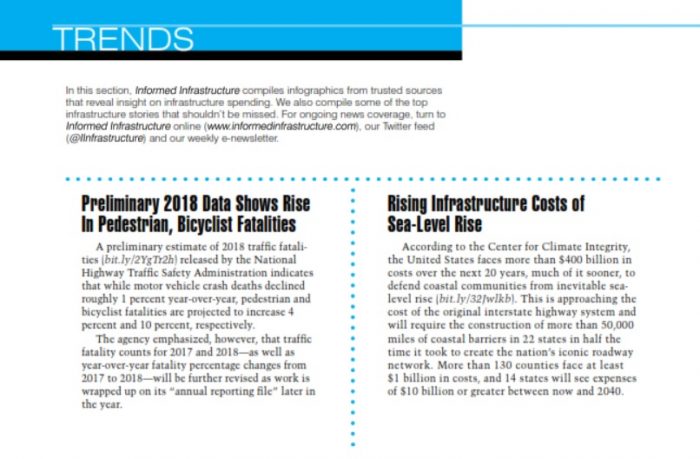August 2019 Trends

A preliminary estimate of 2018 traffic fatalities (bit.ly/2YgTr2h) released by the National Highway Traffic Safety Administration indicates that while motor vehicle crash deaths declined roughly 1 percent year-over-year, pedestrian and bicyclist fatalities are projected to increase 4 percent and 10 percent, respectively.
The agency emphasized, however, that traffic fatality counts for 2017 and 2018—as well as year-over-year fatality percentage changes from 2017 to 2018—will be further revised as work is wrapped up on its “annual reporting file” later in the year.
Rising Infrastructure Costs of Sea-Level Rise
According to the Center for Climate Integrity, the United States faces more than $400 billion in costs over the next 20 years, much of it sooner, to defend coastal communities from inevitable sea-level rise (bit.ly/32Jwlkb). This is approaching the cost of the original interstate highway system and will require the construction of more than 50,000 miles of coastal barriers in 22 states in half the time it took to create the nation’s iconic roadway network. More than 130 counties face at least $1 billion in costs, and 14 states will see expenses of $10 billion or greater between now and 2040.
11 Million People Employed in Renewable Energy Worldwide in 2018
According to the latest analysis by the International Renewable Energy Agency (IRENA), 11 million people were employed in renewable energy worldwide in 2018. This compares with 10.3 million in 2017. As more countries manufacture, trade and install renewable energy technologies, the latest “Renewable Energy and Jobs—Annual Review” finds that renewables jobs grew to their highest level despite slower growth in key renewable energy markets, including China.
Increasingly, however, East and Southeast Asian countries have emerged alongside China as key exporters of solar photovoltaic panels. Countries including Malaysia, Thailand and Vietnam were responsible for a greater share of growth in renewables jobs last year, which allowed Asia to maintain a 60 percent share of renewable energy jobs worldwide.
Global Power M&A Market Remained Strong in 2018

The global power mergers and acquisitions (M&A) market remained strong in 2018 with transaction volumes reaching $158 billion, the second highest in the last five years. However, the number of deals registered decreased to 622, compared to 651 deals in 2017, according to GlobalData, a data and analytics company.
Out of the 622 transactions reported in 2018, 597 were acquisitions while the remaining 25 were mergers. As of 2019 year-to-date (YTD), 244 M&A deals were witnessed. The largest announced M&A deal in the power industry in 2018 was the acquisition of Innogy by E.ON for $52.9 billion.
To read the full report, visit bit.ly/2GsQqle.
A boom in U.S. freight activity is highlighting the need for transportation infrastructure investments, according to the 30th annual “State of Logistics” report compiled by consulting firm A.T. Kearney with the support of the Council of Supply Chain Management Professionals and Penske Logistics.
Michael Zimmerman, a partner with A.T. Kearney and principal author of the report, chaired a panel discussion at the National Press Club in Washington, D.C., on June 18, 2019, to discuss its findings. The report notes that U.S. business logistics costs increased 11.4 percent in 2018 to $1.64 trillion, representing 8 percent of the nation’s $20.5 trillion gross domestic product.
For access to the full report, visit bit.ly/2JZJ0Hl.
Carbon Challenge Encourages Reductions in Buildings’ Operational Carbon Footprint
Dow and the U.S. Green Building Council (USGBC) announced a Carbon Challenge that looks to address increasing built environment growth by encouraging reductions in the operational carbon footprint of buildings. The Carbon Challenge award will recognize office buildings and shopping centers in North Asia (Japan, South Korea and Greater China) that have reduced carbon emissions and improved energy efficiency beyond “business as usual.”
Registration for the award will close Aug. 31, 2019. More details and the submission form can be found at www.carbon-challenge.com.
TOP Stories
The following are the top stories from the last few months (in terms of traffic) on the Informed Infrastructure website. This also reflects key coverage areas that are regularly refreshed online and via our weekly e-newsletter. Simply search key words on Informed Infrastructure online to find the full story.
Buildings
• HLW New Jersey’s 2 Journal Square
• Video: Restoring Paris’ Oldest Church
• Siemens Helps Design Miami Skyscraper’s Safety, Security, and Automation
• AISI Releases Cold-Formed Steel Shear Wall Design Guide, 2019 Edition
Transportation
• FHWA Lacks Adequate Oversight and Guidance for Engineer’s Estimates
• APTA Study: Public Transit Investment Stimulates a 4-to-1 Return
• Stantec Selected to Lead Displaced Left-turn Intersection Design in Fayette County, Georgia
Water
• IECA Announces Volunteer Awards at the 2019 Annual Conference
• New ASCE Publication Offers Insight Through Real-World Experiences with Water Management
• King County, Washington, Selects Brown and Caldwell to Develop Clean Water Plan
• Video: Performance-Based Specifications to Improve Water Infrastructure
Tools and Technology
• SimActive Software Used with eBee X for Shoreline Mapping
• Leica Geosystems Further Digitalises Construction with New Machine Control Solutions
• See What’s New in Revit 2020
• Topcon Announces Cloud-Connected Logistics Application for Paving
• Bentley Systems Announces Availability of OpenSite Designer


